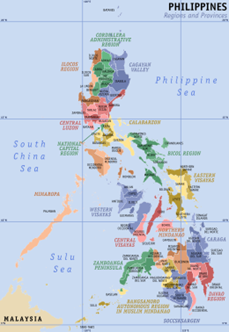By Rafael Antonio, Filipino University Student in Leeds
Coming to the United Kingdom was not a simple decision. Like many other Filipinos, who have sought a higher education in countries not of our own, we are considered “fortunate” unlike our counterparts (the OFW – overseas Filipino workers) who instead go abroad for work. Indeed, regardless of intent, both the Filipino student and worker must go through the tedious, expensive, and time-consuming process of securing proper documentation before being granted entry – and then come to the painful goodbye, in which we say goodbye to all we have known and to all we have loved, for how long, we do not know.
 Why is that, then? Why would so many bright minds and talented able-bodied workers come to a country not of their own? The answer is as simple as it is sad: Corruption in their homeland. True, many have come abroad to escape it, while others, forced to leave because of it. One can only imagine the surprise and disappointment of some students and workers of Filipino descent when the very same corruption made its presence known in a place they went to, to avoid it.
Why is that, then? Why would so many bright minds and talented able-bodied workers come to a country not of their own? The answer is as simple as it is sad: Corruption in their homeland. True, many have come abroad to escape it, while others, forced to leave because of it. One can only imagine the surprise and disappointment of some students and workers of Filipino descent when the very same corruption made its presence known in a place they went to, to avoid it.
During May of this year, the city of London was greeted with a bus ad that featured Nurse May Parsons, a British woman of Filipino descent, which celebrated her services to the NHS and achieving a milestone of administering one of the first Covid19 vaccines.(1) “We give the world our best. The Philippines.” the ad proudly stated, or more likely, deliberately misconstrued the current state of the nursing profession in the Philippines.[1]
In truth, the Philippines is currently facing a nursing shortage due to low wages and awful working conditions. This depressing state of work was made more apparent during the COVID19 pandemic, so much so that the Filipino government banned the deployments of nurses bound abroad between April and December of 2020 as a solution to the shortage.(2)
For two consecutive years, the Philippines was ranked to be the worst place to be in during the pandemic.(3, 4) During this period, Filipino nurses were forced to work and operate under deplorable and slave-like conditions. It was not uncommon to hear reports of the various ways they were mistreated in their own country and by their own government – forced to take vaccines of questionable origins, made to work overtime while wearing diapers, the mandatory use of pseudo-medical paraphernalia bought by the government from organizations linked organized crime, denied their wages and payments promised to them at the start of the deployment ban, and the worst fate of the most unlucky being infected by the virus itself and left to die .(5)
The claim that the Philippines is “giving its best” is as striking as it is depressing when one compares the two different realities a nurse from the Philippines may experience. The Covid19 pandemic is now over, but the Philippines is planning to hire thousands of unlicensed nurses to address its shortage.(6)
The ad, in truth, was a marketing campaign by the government of Filipino president, Ferdinand Marcos Jr. whose family institutionalized the presence of not only Filipino nurses but of all Filipinos working overseas.(7) It was in the 1970s, that his father the Dictator Ferdinand Marcos declared martial law – and began bankrupting the country by pocketing the country’s money and international donations, while his military forces caused the deaths and torture of the thousands of who would dare speak out or was suspected of speaking out. As a “solution” to the crisis he brought on, the export of cheap Filipino labor was designed and survives to this day.(8) Millions of Filipinos, since then have said goodbye to their country and families, sacrificing their time and gambling their safety as the institution has become an outlet of human trafficking and abuse both by their working agencies and their employers.(9)
 In a better world, the presence of Filipinos working overseas would be done out of a genuine desire to offer their services and help make the world a better place – rather than being forced to leave their native land and families due to the corruption of their leaders and the appalling working conditions that are offered to them.
In a better world, the presence of Filipinos working overseas would be done out of a genuine desire to offer their services and help make the world a better place – rather than being forced to leave their native land and families due to the corruption of their leaders and the appalling working conditions that are offered to them.
A better world is indeed still possible. But it needs to begin with us. Two Catholic Social teachings have already laid out the best way of how to make this possible. We must recognize the “dignity of the worker” and practice “solidarity”.
In simple terms, while indeed we must recognize the explementary service/s of Filipinos in healthcare, we mustn’t patronize them in the same manner of the administration of the Marcoses. Instead, we must ensure that their rights both as workers and humans are respected, recognized and fulfilled. By solidarity, we must understand the weight of their efforts, by familiarizing and being more aware of their history and how, we may have overlooked their presence and services to a country not of their own.
Sources and references:
Alibudbud, Rowalt. “When the ‘Heroes’ ‘Don’t Feel Cared for’: The Migration and Resignation of Philippine Nurses amidst the Covid-19 Pandemic.” Journal of global health, May 23, 2022. https://www.ncbi.nlm.nih.gov/pmc/articles/PMC9126038/.
Arnaldo, Ma. Stella F. “‘the Best’ for Rollout in US, Middle East: Ma. Stella F. Arnaldo.” BusinessMirror, May 12, 2023. https://businessmirror.com.ph/2023/05/12/the-best-for-rollout-in-u-s-middle-east/.
Beltran, Michael. “Philippines to Hire Unlicensed Nurses as Shortages Bite.” Nikkei Asia, July 10, 2023. https://asia.nikkei.com/Business/Health-Care/Philippines-to-hire-unlicensed-nurses-as-shortages-bite#:~:text=The%20Philippines’%20Department%20of%20Health,be%20eligible%20for%20temporary%20licenses.
Bloomberg News. “Why the Philippines Became the Worst Place to Be in Covid.” Bloomberg.com, September 29, 2021. https://www.bloomberg.com/news/articles/2022-01-27/why-the-philippines-is-once-again-the-worst-place-to-be-in-covid?leadSource=uverify+wall.
Calonzo, Andreo. “Covid Best and Worst: Philippines Hits Bottom Again as Omicron Surges.” Bloomberg.com, January 27, 2022. https://www.bloomberg.com/news/articles/2022-01-27/why-the-philippines-is-once-again-the-worst-place-to-be-in-
1 Arnaldo
2 CNA Insider
3 Bloomberg News
4 Calonzo
5 Alibudbud
6 Beltran
7 Romero
8 Medina and Pulumbarit
9 Channel 4 News
